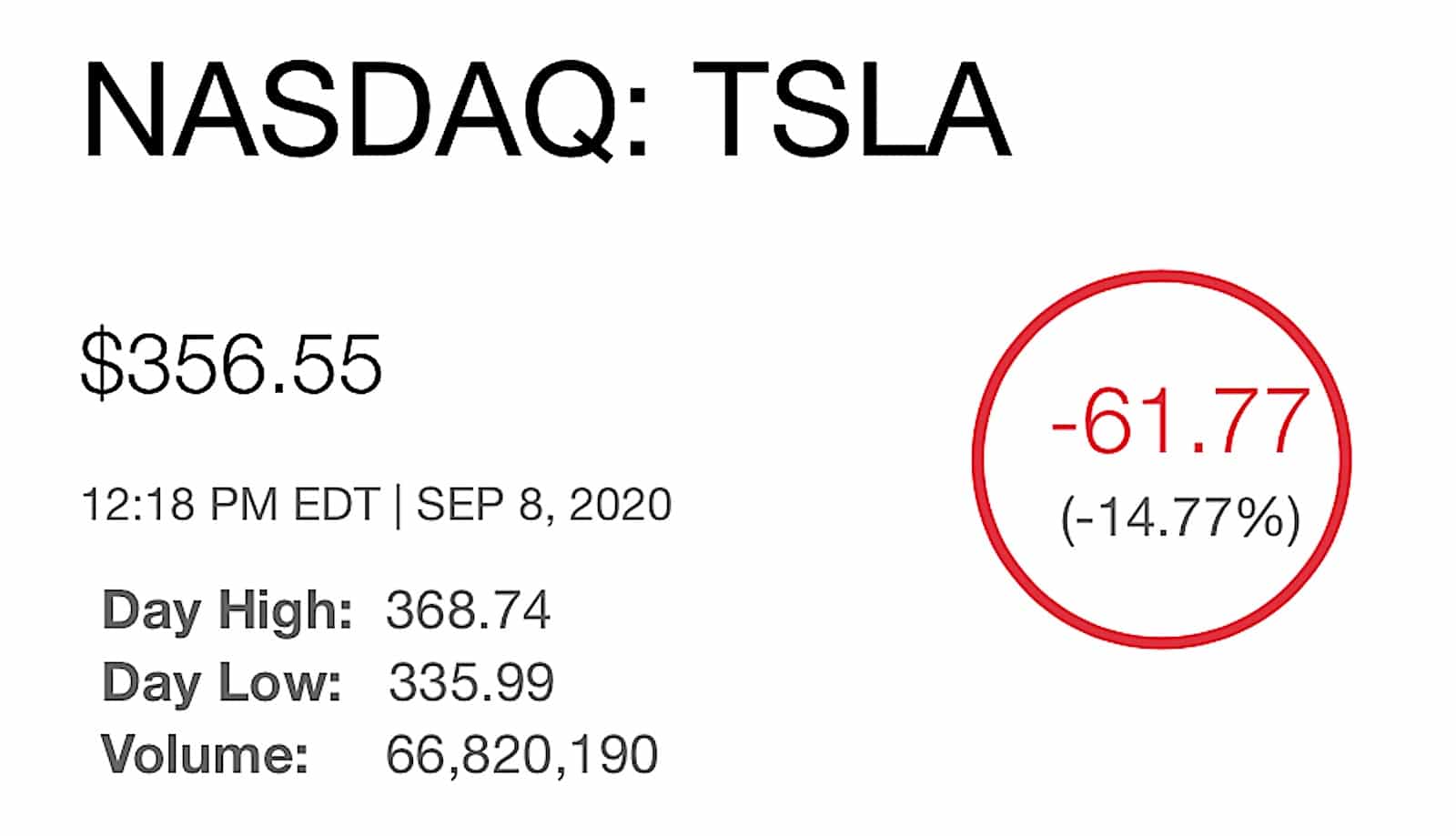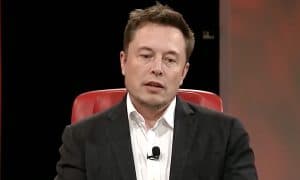
Tesla CEO Elon Musk has seen the EV maker’s stock price soar during the past 12 months, although it’s given back some gains in recent days.
(This story has been updated with new information.)
Is Wall Street losing its lust for Tesla? The California EV maker’s stock has been one of the market’s big stories during this year of pandemic, shares surging as much as tenfold during its 52-week high in August. But despite some forecasts that TSLA shares could continue their astronomical climb, things are starting to look more tenuous.
Could Tesla be in for a reckoning, as some analysts are warning? The automaker’s stock did take a tumble, declining as much as 25% last week before rebounding slightly. But the downward trend resumed in after-hours trading during the long weekend and, shares were off by nearly 15% mid-morning Tuesday as traders returned from the Labor Day holiday.
“We think this is a big, big – one of the biggest of all time – houses of cards that’s getting ready to fold,” New Constructs CEO David Trainer warned during an interview on CNBC last week.
(Tesla raising $5 billion by selling stock after 5-for-1 split.)
That said, Tesla’s stock market collapse has been predicted numerous times throughout the past few years, all to the demise of short sellers who have lost billions betting against the company. Still, there is the possibility it could be “wrecked,” according to website 24/7 Wall Street, which notes that while the market bulls see the possibility of its shares surging as high as $800, the bears are warning the bottom could fall out, with the stock tumbling as much as 95%, which could see it drop as low as $19 a share.
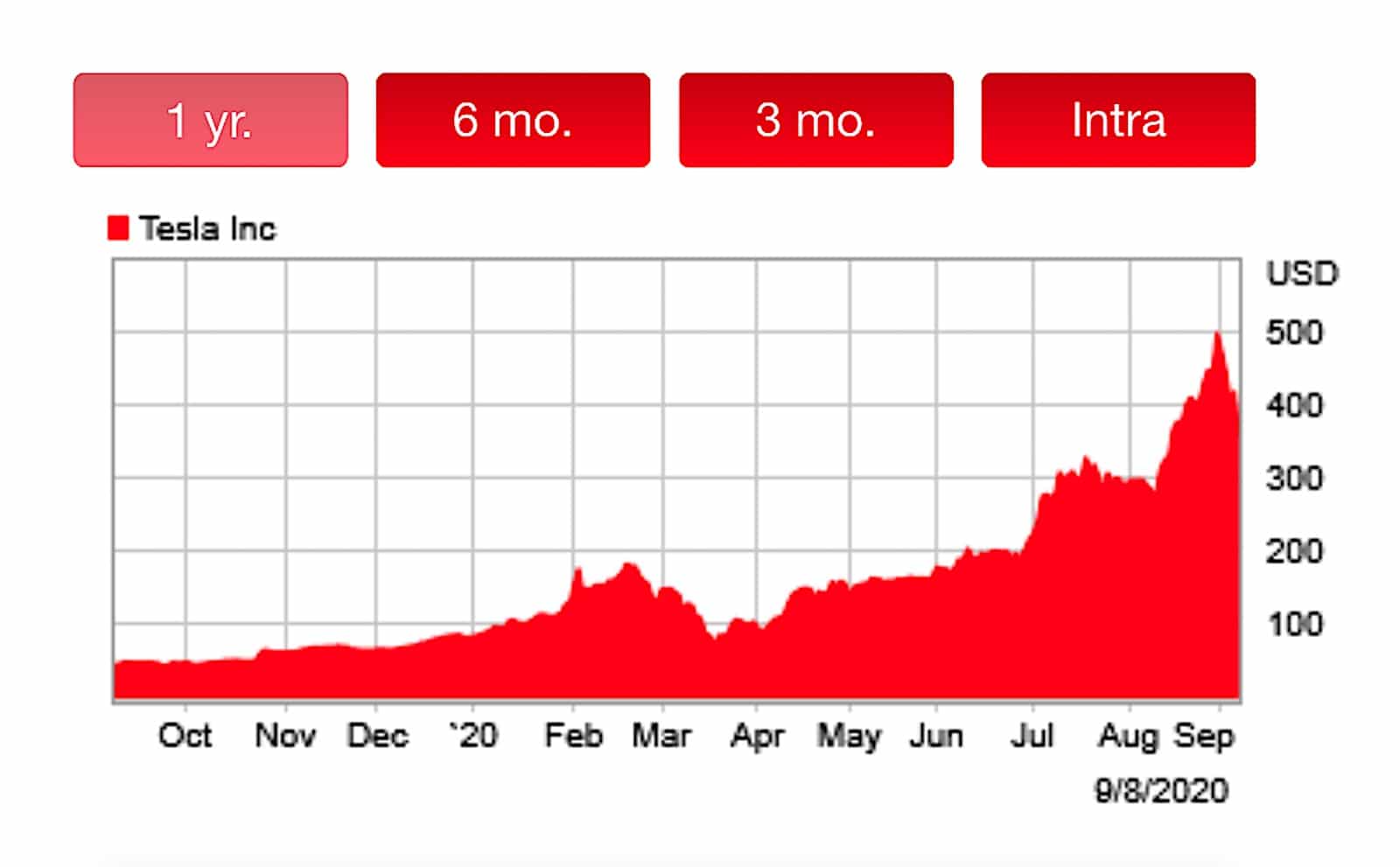
Tesla stock’s been rising like a rocket for much of the last year, although its fallen off some since the 5-for-1 split. (Credit: Tesla.com)
There are a number of things that have gone right for Tesla this year, buoying the stock to a 52-week peak of $2,318.49 – before a five-for-one split last month. (The post-split stock briefly surged over $500 last week before settling back to a Friday close of $418.32.)
Adding further uncertainty to Tesla’s current stock slide are the revelations about investments made by Japan’s SoftBank. The outfit is reportedly the “Nasdaq whale” that has been causing a run up in the tech section — as well as Tesla.
The bank bought roughly $4 billion in call options – tied to a like amount of stock – on tech giants like Amazon, Netflix, Microsoft, Apple and, of course, Tesla, according to a Wall Street Journal story. The biggest sign something was going on was the run up of Tesla’s stock after the announcement it was going to split 5-for-1 on Aug. 31. While it’s not unusual for the stock to rise some after such a proclamation, Tesla gained more than 700 points, streaking from about $1,500 a share to just over $2,300.
Buying the options, forced others to buy the stock, falsely generating excitement and a run up of the EV maker (and others) stock price. The bank also sold off the options at a profit as well, making money on the way up and on the way down.
Although there is no doubt SoftBank’s move inflated Tesla’s stock price, just how much is a matter of debate. Those wary of Tesla are in full “A ha!” mode while fans of the California-based are
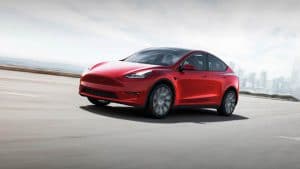
Even the launch of the Tesla Model Y couldn’t electrify the U.S. EV market during the first half of 2020.
downplaying the connection, noting the company is the dominant player in its segment, outselling the competition — combined.
Complicating the matter is the fact that SoftBank has been very involved in the EV section, in terms of investments, pumping billions into deals with General Motors’ Cruise autonomous vehicle unit, Toyota, Honda, Rivian and more.
Tesla vehicle sales held up substantially better than had been feared, especially after the overall automotive market was hammered by the coronavirus pandemic. Sales in China began to boom with the late 2019 opening of Tesla’s second assembly plant in Shanghai. Demand in Europe also was solid. And, in the home U.S. market, Tesla overwhelmed all EV competitors combined, with its Models 3, Y and X the top-selling EVs during the first half of the year.
After years of running up billions of dollars in losses, meanwhile, Tesla finally revealed four consecutive quarterly profits with its second-quarter results solidly in the black even as traditional automakers struggled due to the pandemic.
But there were concerns to be found even in that black ink, skeptics stressed, noting that Tesla’s second-quarter profit was based all but entirely on the sale of zero-emissions credits to rival manufacturers, rather than from vehicles like the new Model Y.
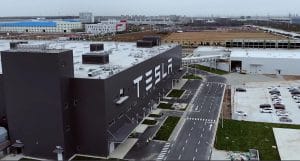
Tesla’s quick recovery in China helped to bolster investor opinion about the EV maker earlier this year.
As competitors such as General Motors, Ford and Fiat Chrysler accelerate their own EV production programs, analysts note, they will have less of a need to buy those credits. At the same time, they will flood the market with competitors to Tesla’s own battery cars.
(EV sales slumped during first half, even Tesla losing ground despite launch of Model Y.)
Just last week, Tesla CEO Elon Musk took a ride in the new Volkswagen ID.3 that will mark its entry into the long-range EV market, pronouncing it to be “pretty good.”
In turn, Volkswagen AG CEO offered his own praise in an online comment suggesting “Elon Musk delivers results that many have deemed impossible,” and adding that “in five to 10 years the world’s most valuable company will be a mobility company – that can be called Tesla, Apple or Volkswagen.”
What’s clear is that Tesla currently ranks as the most valuable auto company in the world. Even after the hits its stock has taken this past week the carmaker has a market capitalization of around $390 billion, or nearly twice that of next-in-line Toyota.
But will that hold? Musk has made bold promises about where Tesla production and sales are heading. But, even if it keeps gaining ground, some analysts are skeptical, New Construct’s Trainer suggesting that it would need to capture more than 40% of the global automotive market to justify where it is trading today.
Adding to these concerns, Tesla is already running into some setbacks. In China in August a new micro-EV marketed through one of General Motors sales channels generated about 15,000 sales compared with just 11,800 for Tesla, according to industry data. In Scandinavia, meanwhile, the new Polestar 2 last month outsold Tesla, with Renault’s latest battery car also topping the U.S. EV maker in other parts of Europe.
So far, no new entry has been able to loosen Tesla’s grip on the sales charts in the U.S., but with so many entries, such as the VW ID.4 and Ford Mustang Mach-E, coming, it may be a matter of time.
But not everyone is worried. CFRA Research, for one, has upped its target price for Tesla to $475 a share, while now rating it Buy, reversing its previous Sell advice. “We think TSLA’s risk/reward is now skewed to the upside and importantly, the stock’s YTD run-up has greatly reduced its cost of capital and helped strengthen its balance sheet,” the research firm said in an advisory note to investors.
(Tesla reports $104M Q2 profit; fourth consecutive quarter of profits.)
Who is right may take time to sort out. CEO Musk has frequently taunted short-sellers, and while Tesla’s stock may have slipped, it is still positioned significantly higher than it was at the beginning of this year.
Michael Strong contributed to this report.

